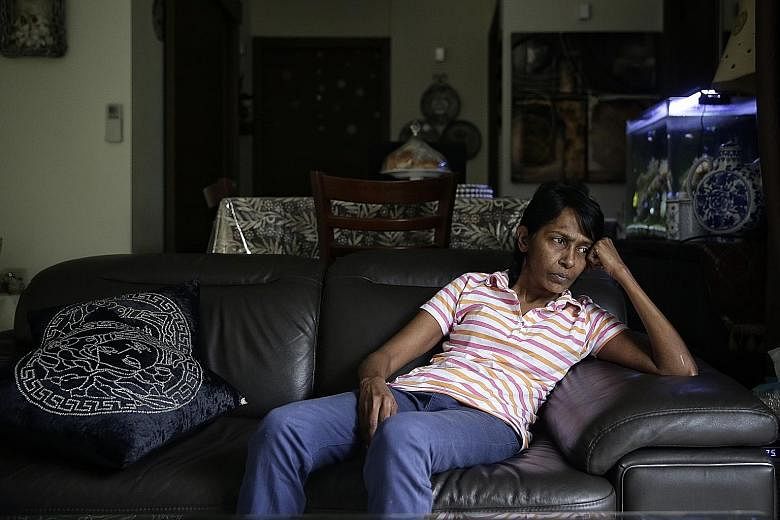From free accommodation to temporary jobs, offers for help have been pouring in for Mrs Irene Clennell, who was deported from Britain last Sunday.
One said Mrs Clennell could put up with her in her HDB flat with no strings attached or rent needed.
Others, including a job placement company, reached out to help her find a part-time job.
And in Britain, a Gofundme page started by her sister-in-law, Ms Angela Clennell, has raised more than £53,000 (S$92,000) from more than 2,700 supporters.
The original target was £10,000.
-
Why she was made to leave Britain
-
When a person is granted an Indefinite Leave to Remain (ILR), it will lapse if they live outside of Britain for two years or more.
Mrs Irene Clennell was granted an ILR in 1992 when she married, but this lapsed after she moved to Singapore from 1992 to 1999 to look after her sick mother.
She entered Britain as a visitor in 2013 and made another application for an ILR. This was refused and her appeal rights were exhausted on July 10, 2014.
The 53-year-old Singaporean is deemed by the British Home Office to have no legal basis to remain in Britain since that date.
She was detained at Dungavel Immigration Removal Centre from Jan 20 this year and deported from the country on Feb 26.
But the goodwill does little to reassure the 53-year-old Singaporean, who has been having sleepless nights since she was forcibly put on a plane and deported back to Singapore under escort.
The eight-hour time difference between Singapore and her home in County Durham, England, means she stays up late to send WhatsApp messages to her husband John, an ailing former gas mains layer, and chatting with her in-laws, sometimes until her prepaid phone credit runs out.
Said Mrs Clennell: "I'm worried about John. He needs a brace now to move around and nowadays my mother-in-law has to take care of him. He's very upset about all this.
"I'm grateful for the job offers but I can't even think about it right now. I'm not in the right state of mind to work."
She has 28 days from the time she was deported to mount a legal case against the deportation - after that, a 10-year travel ban to Britain will be imposed on her.
Her in-laws are still looking for immigration lawyers in Britain.
Mrs Clennell's initial Indefinite Leave to Remain (ILR) in Britain was voided when she lived in Singapore from 1992 to look after her sick mother, who died in 1999. She and her husband and children stayed on in Singapore till 2003.
When they returned to Britain, her applications for an ILR were repeatedly rejected.
She will only be able to apply for a British citizenship if her ILR is still valid and she meets the residency requirements of the country.
The British Home Office said that applications for an ILR are "considered on their individual merits and in line with the immigration rules".
A spokesman added that "we expect those with no legal right to remain in the country, to leave".
For the time being, Mrs Clennell is staying with her older sister Lily Anthony, 54, in a rented condominium apartment in Sembawang.
With six people already living in the three-bedroom unit, she gets the living room couch.
"It is not a big place and my sister has got a lot on her plate too. I feel like I am intruding on their lives," said Mrs Clennell.
When The Sunday Times asked about her relationship with her two sons, John and Sonny, now 27 and 25, Mrs Clennell teared up and asked for a break.
"I could not be there for them when they were growing up," she said after she recomposed herself.
She said their relationship suffered as she could only travel to Britain on a tourist visa. So from 2003, she would meet them for short periods before she had to leave the country.
Once, when returning to Britain from Singapore in 2007, her entry was rejected by immigration officers at Newcastle International Airport.
Mrs Clennell pleaded to the officers to pass the gifts she had brought from Singapore to her husband and their two sons, who were waiting at the arrival hall at the time.
She remembered hearing her younger son wail at the officer, screaming for her as she was taken away.
"They got their presents, but they didn't see their mother," she said, wiping away tears.
The incident meant that Mrs Clennell did not visit her family between 2007 and 2013, as she mistakenly thought there was a five-year travel ban against her.
She was able to re-enter Britain only in 2013, after an immigration officer allowed her to make another application within the country.
During the interview, her phone rang several times. She looked expectantly at the screen, smiling when it was her British family and frowning when it was yet another journalist trying to interview her.
She is aware that the complex immigration situation in Europe could be why she is in the media spotlight, but she shrugged off the notion that she is an icon for migrant rights.
"I have never caused any trouble. I am just a woman trying to get back home," she said.
Said Ms Anthony, thanking readers who came forward to help: "The money from fundraising is meant for her legal fees, and she doesn't use any of it for herself here. She needs all the help she can get."


